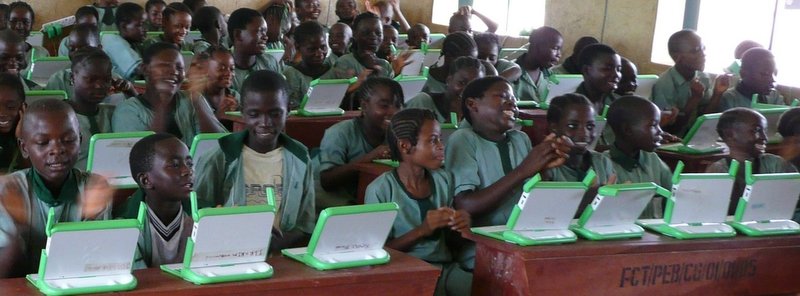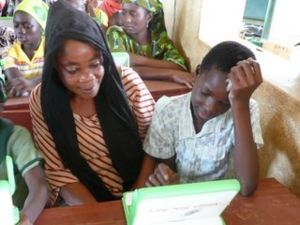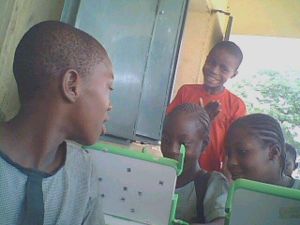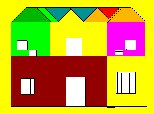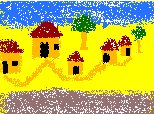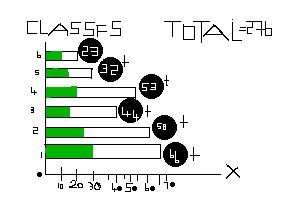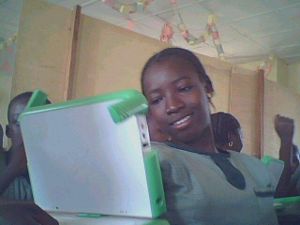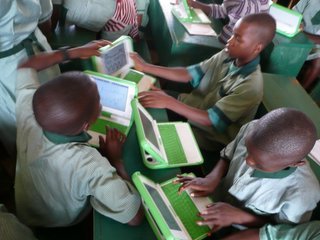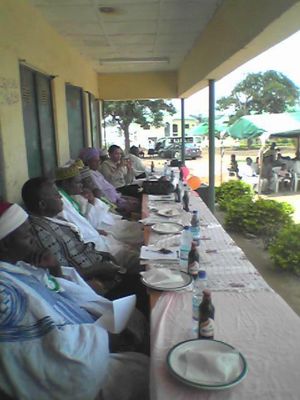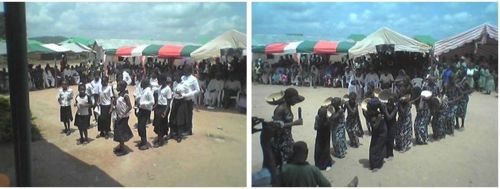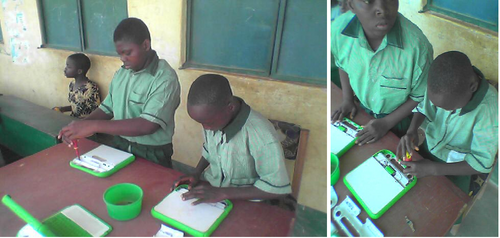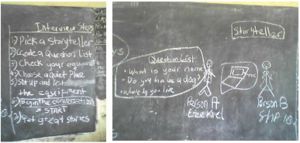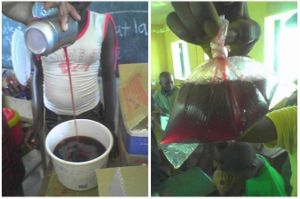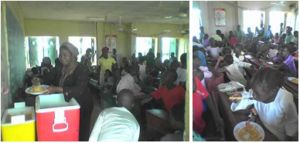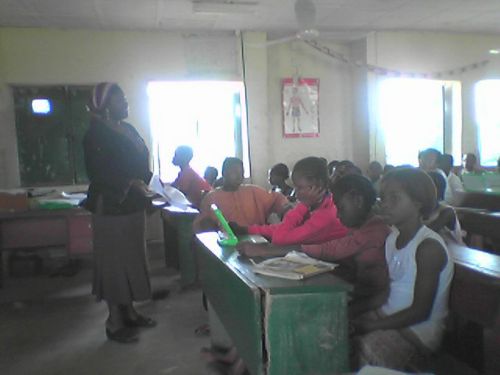OLPC Nigeria/Galadima: Difference between revisions
m (Reverted edits by 115.79.129.208 (Talk) to last revision by Patrol) |
|||
| (11 intermediate revisions by 8 users not shown) | |||
| Line 10: | Line 10: | ||
One Laptop Per Child foundation (OLPC) provided School Galadima in March 2007 with an XO laptop for each child in Primary 4, 5 and 6 and also for each member of the staff. The XOs are for the children to take from home to school every day. From March until December 2007, the XOs have been in a Nigerian educational context as well as in the everyday lives of these children. Pending new funding, the experiment [http://blog.wizzy.com/post/OLPC-and-Classmate-in-Nigeria is closed]. |
One Laptop Per Child foundation (OLPC) provided School Galadima in March 2007 with an XO laptop for each child in Primary 4, 5 and 6 and also for each member of the staff. The XOs are for the children to take from home to school every day. From March until December 2007, the XOs have been in a Nigerian educational context as well as in the everyday lives of these children. Pending new funding, the experiment [http://blog.wizzy.com/post/OLPC-and-Classmate-in-Nigeria is closed]. |
||
Before: |
|||
[[File:GaladimaBeforeOLPCdeployment.jpg|800 px]] |
|||
After: |
|||
| ⚫ | |||
| ⚫ | |||
Learning together (Photo by Rowland) |
Learning together (Photo by Rowland) |
||
Latest revision as of 23:38, 23 July 2013
Ulaanbaatar.mn | Arahuay.pe | Khairat.in | Ban Samkha.th | Galadima.ng | Cardal and CEIBAL.uy | Bashuki.np | Bishwamitra.np | Atlas School.pk | Altos de Cazucá.co [+/-]
(View a BBC slide show of School Galadima here).
OLPC in Nigeria: School Galadima
“I like it when I use it in class.”—Emmanuel, Primary 5, June, 2007
One Laptop Per Child foundation (OLPC) provided School Galadima in March 2007 with an XO laptop for each child in Primary 4, 5 and 6 and also for each member of the staff. The XOs are for the children to take from home to school every day. From March until December 2007, the XOs have been in a Nigerian educational context as well as in the everyday lives of these children. Pending new funding, the experiment is closed.
Before:
After:
Learning together (Photo by Rowland)
L.E.A. Primary School Galadima is a public school in the outskirts of Abuja Model City, with a student population that has its origins in rural areas. School Galadima is a paradigm for OLPC worldwide. The school has no electricity and no water, although neighboring houses do. The children, teachers, principal, and parents are pioneers, who, with the support of the sector’s educational authorities, as well as private and non-private corporations, have in one leap made of the OLPC educational project a matter-of-fact affair at school and at home, in class and, quite often, even at recess. All of a sudden, School Galadima has gone from the age-old chalk-and-board teaching technology to the avant-garde one-laptop-per-child XO technology with cutting-edge features.
Nevertheless, OLPC's mission focus is not on its state-of-the-art innovative technology, but on its educational approach that fosters discovery of knowledge by the children themselves, encouraging them to find the application of that knowledge in a practical and meaningful context. Both, the technology of the OLPC laptop and the methodology of the Constructionist educational approach has been inspired, researched, developed, and implemented by MIT scholars.
Photo by Carla
This successful, on-going experience is setting the basis for a larger deployment in Nigeria and in other developing countries around the world. School Galadima teachers have been developing activities for their classes. Having as an aim that, while compatible with the goals of the public school system’s scheme or educational program, they go beyond it, to the advantage of the children, by enhancing their learning modes and turning them from passive students who just absorb, memorize, and repeat, into active constructionists who actively collaborate, investigate, experiment, and create solutions.
Teachers also collaborate with each other by talking about their activities and their results, even by coming to another teacher’s classroom and participating in an activity to later adapt it to their own group.
Children enjoy working with the laptops in class and out of class. They help each other in their activities and also do projects on their own, some individually, and some in collaboration with their mates, as in the dictionary project. Five primary 4 children are working on a dictionary of their local languages, and working on here means constructing. The project has been modified from a list of words that Abiword (the word processing software activity) did not recognize to a formal-looking local language to English dictionary. They split the team into two to work on two different local languages simultaneously. It is simple but outstanding work. These children work on their dictionary project during school hours in between class assignments, when otherwise they would be restless. Other projects have started in one group, and then, as it evolves, some children from other groups join in.
One day in class, children were using Etoys (a programming software) to work on math concepts while doing animations. Children that had tried it before were reseated in between children that had never worked with Etoys. Then the teacher explained how to start, step by step. It was more effective to have children helping children than paying attention to the teacher. But, since there were so many children, both methods were used to go faster and get to the animation (math logic) part faster and do it all together. However, once children start facilitating you can't stop them. So, after 15 minutes, some children had animations with persons turning round and round, while making frog noises here and there, and then after 30 minutes, there was a whole pond of croaking frogs.
“Pupils go even beyond what I can teach in the class. It's a very interesting thing to use. I personally have a better idea about teaching... We discovered that giving them time to discover something and to do it in their own way, they feel more happy and they are so excited in using it.”— A School Galadima Teacher --Carla 07:32, 1 October 2007 (EDT)
School Closing Ceremony
The first stage of XO testing was concluded on the school’s closing day, after students completed their end-of-term examinations. The day was marked with fanfare, photo shoots and an address by some of the stakeholders with excited students and parents looking on.
The event was also spiced up by the students with performances in the form of traditional dances, activities and school work done on the XOs, a technical demonstration by some students on how to maintain and troubleshoot on their XOs. --Ahmad 13:11, 13 August 2007 (EDT)
Our Stories Summer School
In the days that followed the Close out, the team returned to the school to meet with students (as scheduled between both) to work on the Our Stories activities. Asabe and the students also organized an indoor picnic with the students to spice up the preps for the Our Stories activity. This included rehearsals for "Interviews" the students would conduct among themselves and with other people at their respective home areas. XOs would be used as the interviewing tools (audio-video capture). It seems Ahmad got a little too excited while observing and he drew a logo; Galadima News Network to inspire some of the students on conducting interviews...like pros.
See also
- OLPC: Afrikanske børn elsker den bærbare (Olpc: African children love the laptop)
- http://tomidavies.blogspot.com/2007/07/olpc-test-project-in-nigeria-concludes.html
References
- visit June 2008 Comparison between OLPC and Classmate

